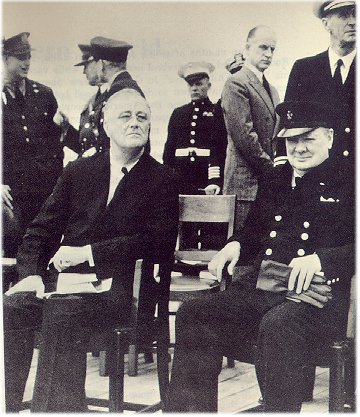The war ends
At Quebec in August 1943, an Anglo-American conference discussed plans for action against Japan and other aspects of military and diplomatic strategy; and two months later, the foreign ministers of Britain, the United States, and Russia met at Moscow; they reaffirmed the unconditional surrender policy, called for the end of Italian Fascism and the restoration of Austria's independence, and endorsed future postwar collaboration among the powers in the interest of peace. At Cairo, where Roosevelt and Churchill met with Chiang Kai-shek, terms for Japan were agreed upon which involved the relinquishment of gains from past aggression. At Teheran on November 28, Roosevelt, Churchill, and Stalin reaffirmed the terms of the Moscow conference and called for a lasting peace through the agency of the United Nations. Almost two years later, in February 1945, they met at Yalta with victory seemingly secure and made further agreements: Russia secretly agreed to enter the war against Japan not long after the surrender of Germany; the eastern boundary of Poland was set roughly at the Curzon line of 1919; after some discussion of heavy reparations in kind to be collected from Germany, demanded by Stalin and opposed by Roosevelt and Churchill, the decision was deferred; specific arrangements were made concerning Allied occupation in Germany and governing the trial and punishment of war criminals; the principles of the Atlantic Charter were reaffirmed in relation to the people of liberated areas. It was readily agreed that the powers in the Security Council of the United Nations should have the right of veto in matters affecting their security. After much difference of opinion in which Roosevelt was ranged on one side and Stalin and Churchill on the other, it was agreed that all the powers would support the Soviet Union's demand for two additional votes in the United Nations Assembly, based on the great populations of the Ukraine and Byelorussia.
 |
| President Roosebelt and Prime Minister Churchill met in 1941 aboard the British battleship Prince of Wales, off Newfoundland, to sign the Atlantic Charter, an eight-point United States-British declaration of principles as a basis for peace. |
Only two months after his return from Yalta, Franklin D. Roosevelt died of a cerebral hemorrhage while vacationing at his "little White House" in Georgia. Few figures in American history have been so deeply mourned both at home and abroad; and for a time the American people suffered from a sense of great and irreparable loss. Democratic leadership, however, rests upon no man's indispensability; it was not long before Roosevelt's successor, Harry S. Truman, was offering effective leadership based upon the essential objectives of New Deal domestic and foreign policy.
By July 1945, when Britain, the United States, and the Soviet Union met in conference again at Potsdam, Germany had surrendered. The general election in Britain took place midway in the conference, with the result that while both Churchill and Clement Attlee attended the first half, Attlee alone remained to conclude the negotiations. Although some aspects of the war in the Pacific were discussed, the essential purpose of the meeting was to formulate an occupation policy and a program for the future of Germany. It was agreed that sufficient industrial capacity should be left to Germany for an ample peacetime economy but that there should be no margin of surplus available to rebuild a war machine. Known Nazis were to be tried, and where trials established that they had taken part in the senseless slaughter that had been called for in the Nazi plan, they were to suffer the death penalty. The necessity of assisting in the re-education of a German generation reared under Nazism was agreed upon, as well as the broad principles governing the restoration of democratic political life to Germany. Much time was spent discussing the reparations claims against Germany. The removal of industrial plant and property by the Soviet Union from the Russian-occupied zone was provided for, as well as some additional property from the western zones; but the Russian claim, already raised at Yalta, for reparations totaling $10,000,000,000 remained a subject of controversy. In November 1945, at Nuremberg, the criminal trials that were provided for at Potsdam took place. Before a group of distinguished jurists from Britain, France, the Soviet Union and the United States, the German leaders were accused not only of plotting and waging aggressive war but also of violating the laws of war and humanity. The trial lasted more than ten months and resulted in the conviction of all but three of the defendants.
